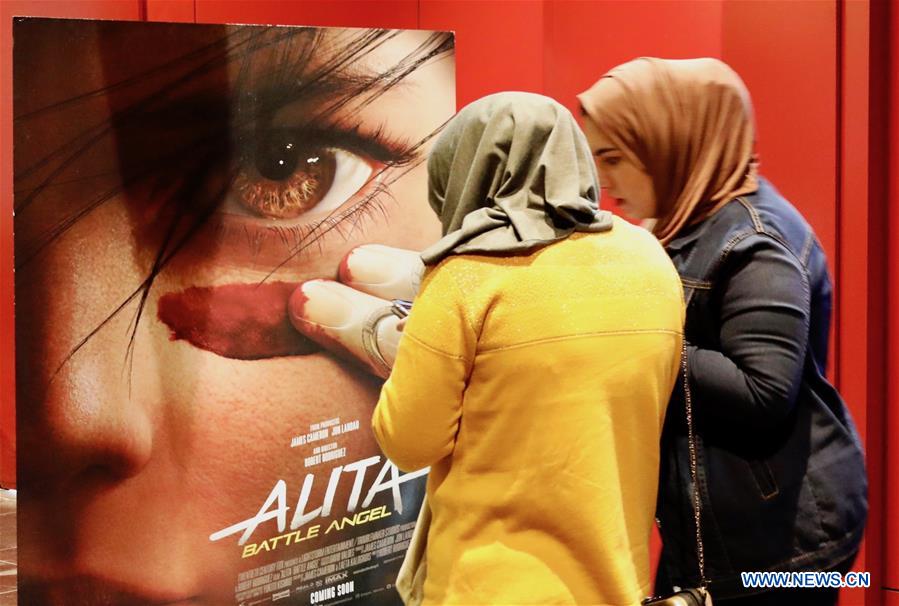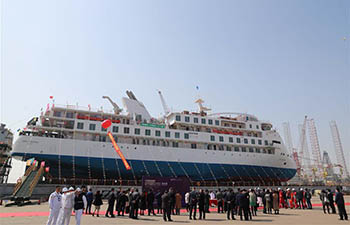 ?
?Photo taken on Feb. 21, 2019 shows two Iraqi women beside a movie poster at a movie theater in Baghdad, Iraq. (Xinhua/Khalil Dawood)
BAGHDAD, March 13 (Xinhua) -- In the Iraqi capital Baghdad, decades-old iconic movie theaters remain in ruins, but avid cinemagoers have found solace in multi-screen theaters at shopping centers scattered across the city.
Pointing at the dusty plaque of al-Mashriq cinema, Sabih al-Ouwaini, an Iraqi writer, told Xinhua how he spent summer evenings with his friends in the 1960s and 1970s sitting by the silver screen of al-Mashriq to watch Farid al-Atrash's latest films.
"Baghdad was famous for its cinemas," the cinema aficionado said with regret, lamenting the corrupt Islamic parties for neglecting this sector.
"It is a great blemish," al-Ouwaini said, adding that the government must act to revive old theaters and cinemas for they're not only entertainment centers, but also play a pivotal role in educating people.
Among the many movie theaters once frequented by families in Baghdad, al-Mashriq cinema and the adjacent Sharazad cinema were transformed into shops and warehouses after their owners suffered great losses in the economic decline in 1990s, which affected all aspects of life in the country.
With the eruption of the U.S.-led war against Iraq in 2003, all cinemas in Baghdad closed their doors, most of which never open again.
For eight years, Baghdad's cinephiles had to watch their favorite films on the internet, TV or pirated DVDs, until 2011 when the modern Iraqi cinemas opened and later expanded across the country.
"We have multi-screen theaters in three locations in Iraq: Baghdad, and the provinces of Duhok and Babil," Issa al-Alousi, director of a cinema hall in Baghdad Mall, told Xinhua.
"We show various films such as Hollywood, Bollywood and Arab films, and sometimes Iraqi films," al-Alousi said.
"Through our mobile app, people can know the titles of films and show times, and soon they will be able to pre-order tickets through the app," he added.
According to the cinema director, the peak attendance happen on the weekends and Mondays when the cinemas provide 50-percent discount on tickets.
"We also have a VIPs' hall with comfortable adjustable seats and food ordering feature," al-Alousi noted.
The audience can enjoy soft drinks, caramel, salted popcorn and even fast food meals, he added.
Families and young people arrive en masse at the Iraqi cinema, enjoying Hollywood's latest releases or their favorable new Arab comedy films, embracing modern life and putting behind years of war and violence.
Jabbar Joudi, head of the Iraqi Artists Syndicate, lauded the role of the Iraqi modern cinema in reviving the industry in the country while blaming the U.S.-led invasion for destroying the country's infrastructure and social fabric.
"In the past, it was a weekly tradition for Iraqi families to go to cinemas and theaters, a tradition that was maintained even during the eight-year war with Iran in the 1980s," Joudi said.
Abas al-Hindi, who has been running a small restaurant at the compound of the Rex and Roxy cinemas in al-Rashid Street, told Xinhua that central Baghdad was renowned for its elegant cinemas.
"Cinemas in the area have vanished," al-Hindi said, as he stood where once the chairs were lined up in rows in front of the screen of Rex and Roxy's summer outdoor cinema.
Al-Hindi blamed subsequent governments for neglecting the area.
"Your wallet could be snatched as you walk around here. Families don't visit the area anymore. It is not safe," he explained.
However, the modern Iraqi cinemas continue to "bring back the cinema culture to the Iraqi society," al-Alousi said, with the numbers of avid cinemagoers increasing every day.














